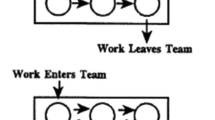Abstract
The study presented in this paper was designed to investigate the relationship between psychosocial aspects of project work and team-based activities that enable reflection upon project teams’ own practices. The study includes 144 project-active product developers in 20 Swedish manufacturing companies. Data were collected by means of a questionnaire survey. The main question addressed was how individual project members’ psychosocial work environment is related to participation and involvement in team-based reflecting activities. A further question was whether reflectivity in local project teams is related to improvement to overarching processes. The results show that three of the tested factors promote reflectivity in project teams, such as a high level of project work experience, a high level of time pressure, and extensive managerial support. It is also shown that reflecting activity at local project team level is associated with improvement to project management processes at a more general level.
Similar content being viewed by others
References
Beer M, Eisenstat RA, Spector B (1990) The critical path to corporate renewal. Harvard Business School Press, Boston
Cooper KG, Lyneis JM, Bryant BJ (2002) Learning to learn, from past to future. Int J Project Manage 20:213–219
Cummings T (1978) Self-regulating work groups: a sociotechnical synthesis. Acad Manage Rev 3:625–634
Ellström PE, Kock H (1999) Ständiga förbättringar som lärandeprocess [Continuous improvements as a learning process]. In: Nilsson T (ed) Ständig förbättring—om utveckling av arbete och kvalitet [Continuous improvements–on development of work and quality]. AB Boktryck, Helsingborg (in Swedish)
Gladstein D (1984) Groups in context: a model of task group effectiveness. Admin Sci Quart 29:499–517
Gersick C (1988) Time and transition in work teams: toward a new model of group development. Acad Manage J 31:9–41
Gersick C (1989) Marking time: predictable transitions in task groups. Acad Manage J 32:274–309
Gersick C (1995) Everything new under the gun—creativity and deadlines. In: Ford CM, Gioia DA (eds) Creative actions in organisations. Thousand Oaks, Sage
Hackman JR, Wageman R (1995) Total quality management: empirical, conceptual, and practical issues. Admin Sci Quart 40:309–342
Hovmark S, Thomsson H (1995) ASK—ett frågeformulär för att mäta arbetsbelastning, socialt stöd, kontroll och kompetens i arbetslivet [ASK—a questionnarie for measuring workload, social support, control and competence in work life]. Reports from the Department of Psychology, Stockholm University, no. 86 (in Swedish)
Ingelgård A, Norrgren F (2001) Effects of change strategy and top-management involvement on quality of working life and economic results. Int J Ind Ergonom 27:93–105
Katzenbach JR, Smith DK (1994) The wisdom of teams—creating the high performance organization. McKinsey and Company Inc, USA
Kotter JP (1996) Leading change. Harvard Business School Press, Boston
Levi D, Slem C, Young A (1994) Teamwork in research and development organizations. In: Bradley GE, Hendrick HW (eds) Human factors in organizational design and management—IV. Elsevier, Amsterdam
Lindberg P, Berger A (1997) Continuous improvement: design, organisation and management. Int J Technol Manage 14:86–101
Lindkvist L, Söderlund J, Tell F (1998) Managing product development projects: on the significance of fountains and deadlines. Organ Stud 19(6):931–951
Locke EA, Saari LM, Shaw KN, Latham GP (1981) Goal setting and task performance: 1969–1980. Psychol Bull 90:125–152
Lundin RA, Söderholm A (1995) A theory of the temporary organization. Scand J Manage 114:437–455
Manz CC, Keating DE, Donnelon A (1990) Preparing for an organizational change to employee self-management: the managerial transition. Organ Dynam 492:15–26
McDonough EF III (2000) Investigation of factors contributing to the success of cross-functional teams. J Product Innov Manage 17:221–235
Nordqvist S, Hovmark S, Zika-Viktorsson A (2004) Perceived time pressure and social processes in project teams. Int J Project Manage 22(6):263–268
Pinto J, Covin J, (1989) Critical factors in project implementation: comparison of construction and R&D projects. Technovation 9:49–62
Porras JI, Robertson PJ (1990) Organizational development: theory, practice and research. In: Dunnette M, Hough L (eds) The handbook of industrial and organizational psychology. Consulting Psychologist Press, Palo Alto, CA
Riis JO, Mikkelsen H (1996) Håndbog i projektledelse [Handbook in project management]. Forlaget Promet, Copenhagen (in Danish)
Safizadeh M (1991) The case of work groups in manufacturing operations. California Management Review Summer, pp 61–82
Schön DA (1983) The reflective practitioner: how professionals think in action. Basic Books, New York
Shenhar A, Dvir D (1996) Toward a typological theory of project management. Res Policy 25:607–632
Sundström P, Zika-Viktorsson A (2003) Innovation through explorative thinking in product development projects. In: Proceedings for 14th international conference on engineering design—ICED 03. Stockholm, Sweden, August 19–21
Sundstrom E, De Meuse K, Futrell D (1990) Work teams: applications and effectiveness. Amer Psychol 452:120–133
Susman GI (1976) Autonomy at work: a sociotechnical analysis of participative management. Praeger, New York
Thamain HJ (1990) Managing technologically innovative team efforts toward new product success. J Product Innov Manage 7:5–18
Van Erd W (2000) Procrastination: self-regulation in initiating aversive goals. Appl Psychol 49(3):372–389
Weldon E (2000) The development of product and process improvements in work groups. Group Organ Manage 25(3):244–268
West MA (1996) Reflexivity and work group effectiveness: a conceptual integration. In: West MA (ed) Handbook of work group psychology. Wiley, UK
Zika-Viktorsson A, Pilemalm J (2001) Product development models for shorter lead-times and more rational processes: its effects on the work situation for project managers and project group. In: Proceedings of the 13th international conference for engineering design—ICED 01. Glasgow, UK, August 21–23
Zika-Viktorsson A. Hovmark S, Nordqvist S (2003) Psychosocial aspects of project work. A comparison between product development and construction projects. Int J Project Manage 21(8):563–569
Author information
Authors and Affiliations
Corresponding author
Appendix
Rights and permissions
About this article
Cite this article
Zika-Viktorsson, A., Ingelgård, A. Reflecting activities in product developing teams: conditions for improved project management processes. Res Eng Design 17, 103–111 (2006). https://doi.org/10.1007/s00163-006-0019-1
Received:
Revised:
Accepted:
Published:
Issue Date:
DOI: https://doi.org/10.1007/s00163-006-0019-1




